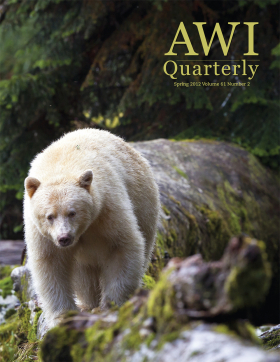Volume
61
Number
2

About the Cover
The Kermode, or “spirit” bear (Ursus americanus kermodei), is a subspecies of the American black bear who lives only in the red cedar, hemlock, and spruce rainforest of Canada's Pacific coast. About one tenth of the bears are white, owing to a unique recessive trait. A proposed Northern Gateway Pipeline project would carry oil from Alberta's tar sands through the coastal forests to a port in remote Kitimat, British Columbia—to be shipped via massive tankers that would thread the rocky, island-studded Inside Passage on their way to Asia. An oil spill in this region could be catastrophic for the bears and the salmon upon which they depend. Tar sand and other oil development has enormous—but often ignored—impacts on animals.